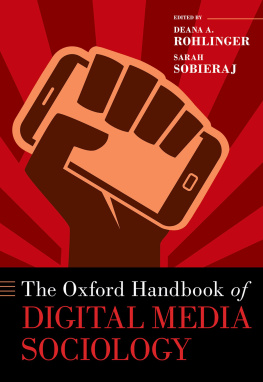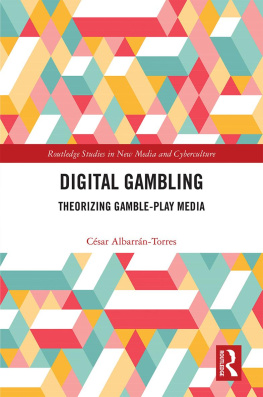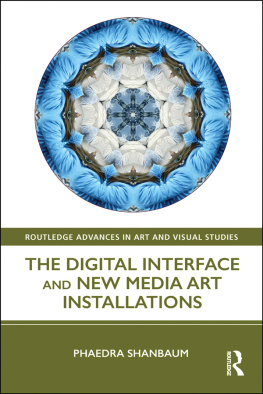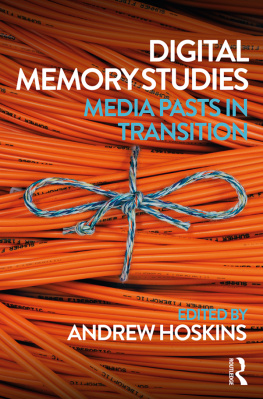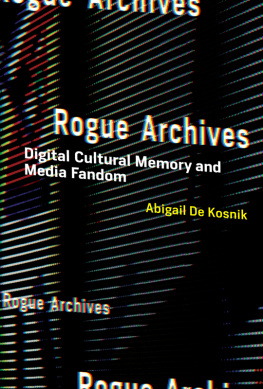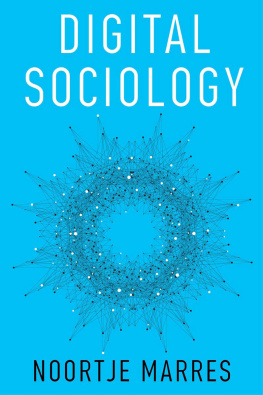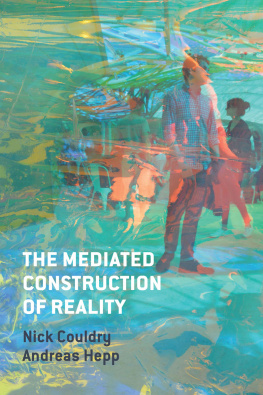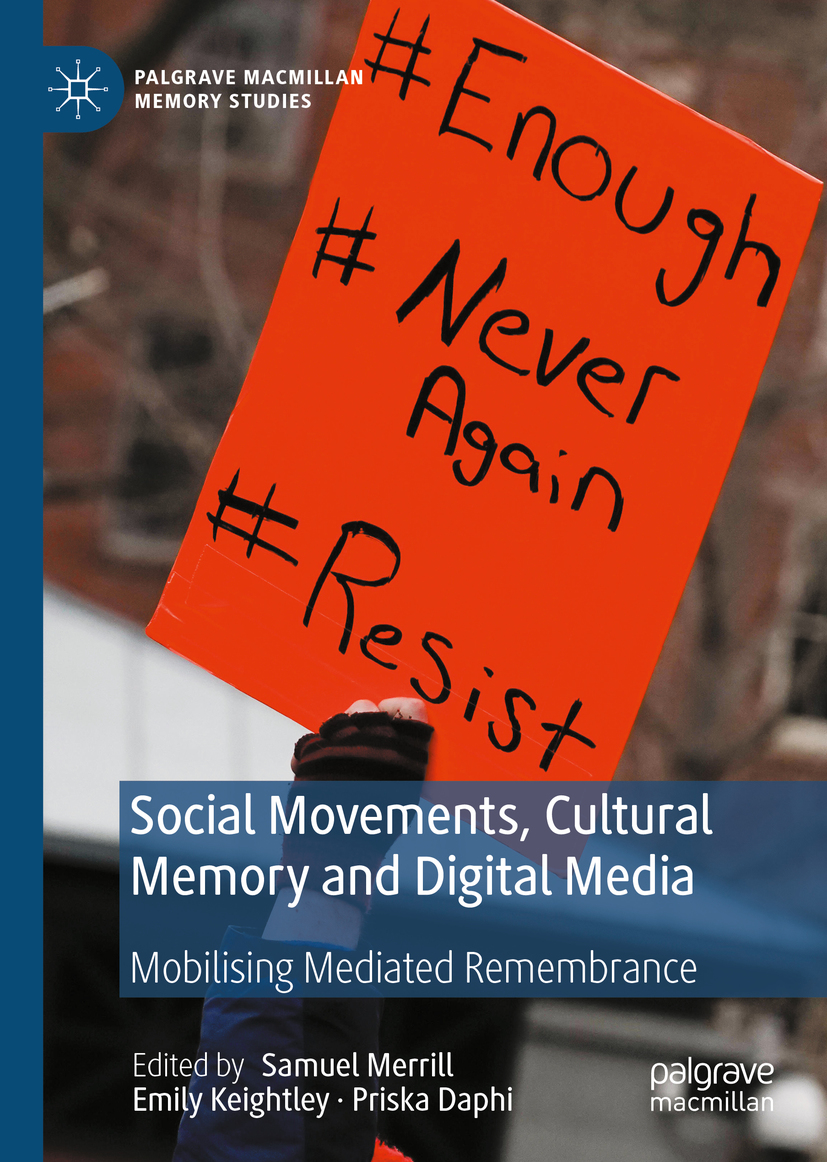Palgrave Macmillan Memory Studies
Series Editors
Andrew Hoskins
University of Glasgow, Glasgow, UK
John Sutton
Department of Cognitive Science, Macquarie University, Macquarie, Australia
The nascent field of Memory Studies emerges from contemporary trends that include a shift from concern with historical knowledge of events to that of memory, from what we know to how we remember it; changes in generational memory; the rapid advance of technologies of memory; panics over declining powers of memory, which mirror our fascination with the possibilities of memory enhancement; and the development of trauma narratives in reshaping the past. These factors have contributed to an intensification of public discourses on our past over the last thirty years. Technological, political, interpersonal, social and cultural shifts affect what, how and why people and societies remember and forget. This groundbreaking new series tackles questions such as: What is memory under these conditions? What are its prospects, and also the prospects for its interdisciplinary and systematic study? What are the conceptual, theoretical and methodological tools for its investigation and illumination?
More information about this series at http://www.palgrave.com/gp/series/14682
Editors
Samuel Merrill
Ume University, Ume, Sweden
Emily Keightley
Loughborough University, Loughborough, UK
Priska Daphi
Bielefeld University, Bielefeld, Germany
Palgrave Macmillan Memory Studies
ISBN 978-3-030-32826-9 e-ISBN 978-3-030-32827-6
https://doi.org/10.1007/978-3-030-32827-6
The Editor(s) (if applicable) and The Author(s), under exclusive license to Springer Nature Switzerland AG 2020
This work is subject to copyright. All rights are solely and exclusively licensed by the Publisher, whether the whole or part of the material is concerned, specifically the rights of translation, reprinting, reuse of illustrations, recitation, broadcasting, reproduction on microfilms or in any other physical way, and transmission or information storage and retrieval, electronic adaptation, computer software, or by similar or dissimilar methodology now known or hereafter developed.
The use of general descriptive names, registered names, trademarks, service marks, etc. in this publication does not imply, even in the absence of a specific statement, that such names are exempt from the relevant protective laws and regulations and therefore free for general use.
The publisher, the authors and the editors are safe to assume that the advice and information in this book are believed to be true and accurate at the date of publication. Neither the publisher nor the authors or the editors give a warranty, expressed or implied, with respect to the material contained herein or for any errors or omissions that may have been made. The publisher remains neutral with regard to jurisdictional claims in published maps and institutional affiliations.
Cover design: eStudioCalamar
Cover image: Rich Crable Photography / Alamy Stock Photo
This Palgrave Macmillan imprint is published by the registered company Springer Nature Switzerland AG.
The registered company address is: Gewerbestrasse 11, 6330 Cham, Switzerland
Preface
As we were putting the final touches on this volume before submission our social media channels started to be punctuated with reports, videos and images of a protest on 30 June 2019 by hundreds of young Jewish people outside a US Immigration and Customs Enforcement (ICE) detention centre in New Jersey. Sparked into action by recent revelations of the inhumane conditions of ICE detention centres, the protestors echoed the claims made by New York Congresswoman and activist Alexandria Ocasio-Cortez (AOC), who on 17 June drew direct comparisons between the detention centres and concentration camps during a live stream on her Instagram channel. AOC, speaking to those people that were in her words concerned enough with humanity that Never Again means something, faced criticism on Twitter from Republican politicians, including Wyoming Congresswoman Liz Cheney, for invoking and trivialising the memory of the Holocaust through her references to concentration camps and the use of a slogan commonly associated with its remembrance. Despite a Twitter response that clarified her comparison by offering a definition of concentration camps and distinguishing them from death camps, AOCs words were also denounced by the countrys Holocaust Memorial Museum, which released a statement on 24 June reading: The United States Holocaust Memorial Museum unequivocally rejects efforts to create analogies between the Holocaust and other events, whether historical or contemporary.Connecting to a long lineage of debates regarding the exceptionality and the non-representability of the Holocaust, this statement itself was met with an open letter published in the New York Review of Books on 1 July signed by over 200 academicsmany of whom study the Holocaust and are prominent in the field of memory studieswhich, partly out of concern for the ubiquity of the museums declaration, called for its retraction. The letter stated:
The Museums decision to completely reject drawing any possible analogies to the Holocaust, or to the events leading up to it, is fundamentally ahistorical. It has the potential to inflict severe damage on the Museums ability to continue its role as a credible, leading global institution dedicated to Holocaust memory, Holocaust education, and research in the field of Holocaust and genocide studies. The very core of Holocaust education is to alert the public to dangerous developments that facilitate human rights violations and pain and suffering; pointing to similarities across time and space is essential for this task.
AOCs comments not only triggered academic debate regarding the role of comparison in Holocaust research, they also found resonance with a group of young Jewish people who quickly formed the Never Again Action Group and partnered with the immigrant rights group Movimiento Cosecha. By late June, before its first demonstration, the group had already established a considerable internet and social media presence. Reclaiming the Never Again slogan and hashtag from its most recent high-profile appropriators in the American protest landscapethe March for Our Lives youth movement that has sought gun reform since the Parkland school shooting of February 2018 and other more recent shootingsmembers of the Never Again Action Group explicitly drew on their intergenerationally received memories of the Holocaust to declare openly that Never Again is Now. The groups website stated:
As Jews, we were taught to never let anything like the Holocaust happen again. We refuse to wait and seewe know from our own history what happens next. Many of our ancestors narrowly escaped from conditions like what we are seeing today in concentration camps at the border and detention centers around the country. Never again is now. If youve ever wondered what you would have done if you had been alive in the 1940s, this is the moment of truth. This is time to put our bodies on the line because when we say never again, we mean never again for anyone.



